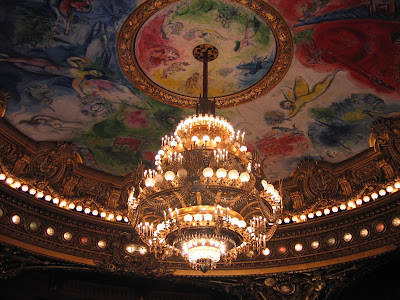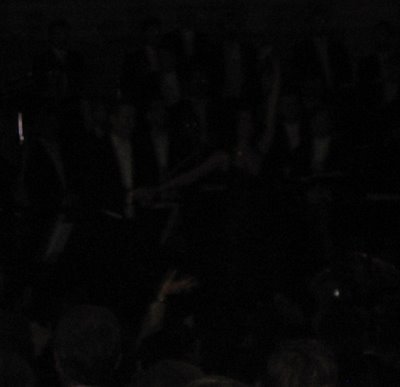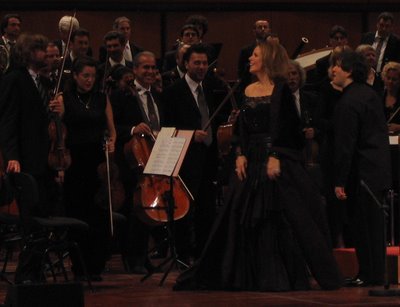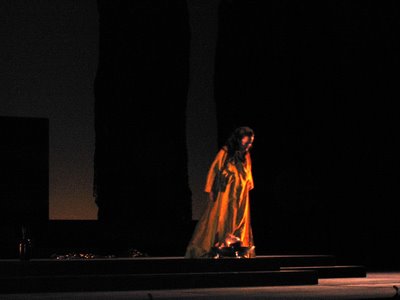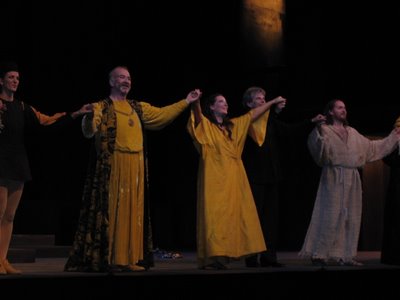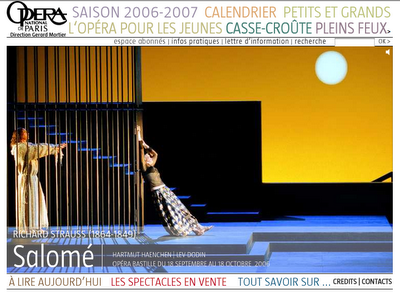
I caught the Met's simulcast at this Lincoln Center, in Miami Beach.
This afternoon I headed to the Regal South Beach cinema on Lincoln Road, Miami Beach. The ticket taker warned me to be sure to hold on to my ticket stub, because, she said, this showing had sold out three weeks ago and it was likely that people would "try to sneak in."
I took my seat a few minutes before 1pm. On the screen were views of the Met auditorium. At first, rock music was blasting. But after a little while we got to hear Met sounds. The orchestra was doing its thing. Then the auditoirum opened up. On screen and in the cinema, I watched people taking their seats, and I took in the mise-en-abime.
There was a countdown every minute on the minute for the last five minutes before curtain. With each minute, the screen displayed a different production photo.
At the opening we were shown a prerecorded (I assume) view of the Met's façade and a greeting from Peter Gelb, who said that opera was meant for the big screen. I think opera was meant for the opera house, but whatever. More on this later.
I was surprised that Katie Couric introduced the opera from backstage. I was glad to see such a major media personality cover the event. Again, I can't tell if her appearance was live or prerecorded.
The opening credits featured excellent footage of the singers getting into costumes and makeup. What a neat idea! The credits ran during the overture, and ended with James Levine.
The cast was uniformly excellent, often outstanding, and there are few better things than the combination of Mozart and Levine. Nathan Gunn is a remarkable actor, his Papageno a highly engaging and memorable characterization. Rene Pape's commanding bass and towering presence dominated every scene in which he appeared (that is this outstanding singer's trademark). It was amusing, though, how awkwardly he delivered his spoken dialogue! I bathed in Matthew Polenzani's gorgeous tone.
The camera directing was extremely natural, and the angles often shifted to just where you'd want them to be.
OK, on to business. I don't know if this big screen thing is such a big deal after all. I mean, at least in the Miami Beach cinema, the sound was awesome, but the HD wasn't so hot. It seemed kind of grainy. That's what happens with digital formats, I suppose. Anyway, I would advise people to sit in the rear of the cinema.
Also, cinema etiquette is different from opera etiquette. Yes, you can eat nachos at the movies. But that means you can also hear your neighbor crunching. And so on.
Another possible concern: watching a 100-minute version of "The Magic Flute" in English and without an intermission is one thing. How will longer, more challenging (for the audience) operas go down? Hm. Probably just fine. We'll see.
With about 20 minutes of the simulcast left, the cinema management switched on a couple of the house lights. It didn't severely alter the image quality , but it was annoying. I suspect that they did this to monitor "sneaking." As we exited the room, we passed three or four staff members who guarded the passageway.
I would probably have preferred to watch this at home on my Sony HDTV with surround sound. Driving a half hour or forty-five minutes and paying twelve dollars in parking (and eighteen dollars per move ticket) to sit in a crowded movie theater with people wasn't so hot. On the other hand, it is pretty neat to see opera on that big screen and to hear it in that glorious sound. So, I will attend these presentations whenever it's possible, and I certainly recommend them to everyone. In fact, I will certainly use these presentations to save me from trips to the Met.
Next weekend will be interesting, as I'll be in the Met auditorium for the I Puritaini matinee, which will be the second performance to be transmitted live from the Met. It will be cool to see how this works from the other side. I'll be watching out for the cameras and lighting. That evening, I will attend Die Zauberfloete, as in the normal version of the opera presented today. Levine, Polenzani, Pape and Polenzani will perform. (On Friday, I will also attend The First Emperor, which will be simulcast the following weekend.)
I didn't join some of the audience members in their ovations for the singers today. It seemed silly, because, well, we could see them but they couldn't see us. It might as well have not been live. Weird.

















